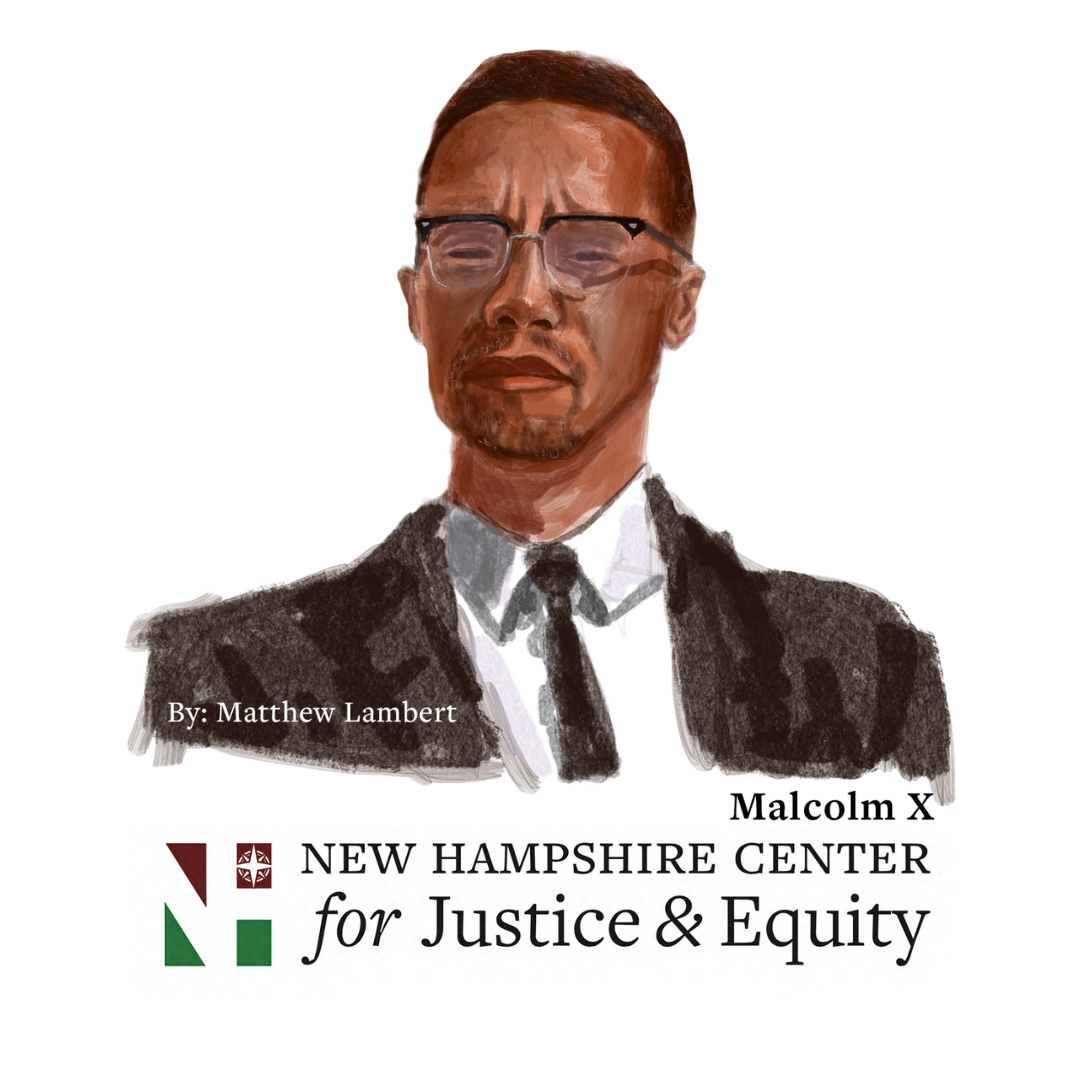Malcolm X: From Radical Empowerment to Global Solidarity
In our Icon Series, we reflect upon individuals who have laid the foundation for our journey toward justice and equity. The New Hampshire Center for Justice & Equity celebrates the extraordinary life of Malcolm X.
Portrait of Malcolm X
About Malcolm X
Malcolm X was a powerful voice for Black empowerment and racial and economic justice. After the murder of his father, and a difficult childhood, he transformed his life during a prison sentence, embracing the Nation of Islam’s teachings and emerging as a prominent leader. Advocating for Black Power, self-defense, and economic independence, he challenged systemic racism with bold, assertive rhetoric promoting unity and global solidarity. Assassinated in 1965, Malcolm X's legacy endures as a symbol of resilience, transformation, and the fight against oppression, inspiring worldwide Black pride.
Early Life: From Adversity to Awakening
Malcolm X, born Malcolm Little on May 19, 1925, in Omaha, Nebraska, had a childhood marked by adversity and loss. His father, a Baptist preacher and supporter of Marcus Garvey's Black nationalist movement, was harassed by white supremacist groups and died under suspicion of foul play when Malcolm was just six years old. His mother was later institutionalized, and Malcolm, along with his siblings, was placed in foster care. These experiences shaped his early understanding of systemic racism and injustice.
As a young man, Malcolm moved to Boston and later to Harlem, where he began working as a street shoe-shiner and became involved in criminal activities. In 1946 he was arrested for burglary and sentenced to 10 years in prison. This period of incarceration was transformative, as Malcolm educated himself, and embraced the teachings of the Nation of Islam (NOI) and its leader Elijah Muhammad. After serving seven years, he was paroled and emerged as a passionate advocate for Black liberation.
“You’re not supposed to be so blind with patriotism that you can’t face reality. Wrong is wrong, no matter who says it.”
Becoming a Voice of Black Empowerment
Upon his release from prison in 1952, Malcolm X moved to Chicago and joined the Nation of Islam (NOI). He quickly became one of the NOI’s most prominent leaders, thought to have increased membership from 500 in 1952 to 30,000 in 1963. At this time, Malcolm changed his last name to "X" to symbolize shedding his "slave name" and honoring his original African name, lost through slavery. As the NOI’s national spokesperson, Malcolm traveled across the country, delivering powerful speeches that challenged mainstream racial narratives and called for Black pride, self-defense, and economic independence.
Unlike the nonviolent approach championed by Dr. Martin Luther King Jr. during the same period, Malcolm X advocated for a more assertive stance and Black nationalism. His radical rhetoric resonated with many who felt that the slow pace of change and the constant threat of violence warranted a more robust defense of Black rights. Malcolm’s ideas represented a paradigm shift, encouraging Black people to reclaim their dignity, assert their worth, and resist oppression unapologetically.
Transformation and a Broader Vision for Unity
In 1964, after a pilgrimage to Mecca, Malcolm X embraced Sunni Islam, transforming his worldview. Witnessing Muslims of all races worship together deeply impacted him, and he began to advocate for unity among all people of African descent, transcending religious and national boundaries. He founded the Organization of Afro-American Unity (OAAU) to promote Black self-determination, human rights, community building, and solidarity on a global scale.
In the same year, Malcolm met Dr. Martin Luther King Jr. for the first time, during the Senate hearings leading up to the Civil Rights Act of 1964. Despite their different views, Malcolm would go on to praise King during a visit to Selma, Alabama in February 1965.
As Malcolm began to view the struggle for Black freedom as part of a larger fight against colonialism and imperialism worldwide, he recognized that systemic oppression wasn’t exclusively an American issue but a global one. This shift in perspective also marked his ultimate departure from the NOI, with whom Malcolm was already disillusioned due to Elijah Muhammads' adulterous conduct.
Legacy of Courage and Power
Rumors that Malcolm was the target of assassination began after his tensions with the NOI escalated. On February 14, 1965, an attempt was made on his life when the home in which Malcolm, his pregnant wife Betty Shabazz, and their four daughters lived was firebombed. Luckily, everyone escaped unharmed. But, just a week later, on February 21, 1965, Malcolm X was assassinated while giving a speech at the Audubon Ballroom in New York City, shot 15 times at close range. Three men, all members of the NOI, were convicted of his brutal killing in March of 1966.
Malcolm X’s life was cut short at 39 years old, but his ideas and influence endured. His legacy is not confined to his role as a Civil Rights leader but extends to his embodiment of resilience, truth-telling, and radical empowerment. He was unafraid to speak out against injustice, even when it put his life at risk, and his journey reflects the power of transformation and self-education.
Malcolm X laid the groundwork for movements that continue to challenge systemic racism, economic exploitation, and cultural erasure. His memory continued to inspire the Black Power movement, consolidated by Stokely Charmichael in 1966. His boldness in speaking out against injustices resonates deeply with the New Hampshire Center for Justice & Equity’s mission. We give thanks to his willingness to address the legacy of racism and intersecting forms of oppression and strive for a society in which everyone can belong.
Who is your icon? We are collecting suggestions for the next series of NHCJE Icons. Let us know who you would honor. Click the button below and leave the name of your nomination.
Learn More About Malcom X
https://kinginstitute.stanford.edu/malcolm-x – Standford University
https://www.wesleyan.edu/mlk/posters/malcolmx.html – Wesleyan University
https://www.malcolmx.com/biography/ – The Official Website of Malcom X
https://pbs.org/wgbh/americanexperience/features/malcolmx-x/ – PBS
https://nmaahc.si.edu/explore/stories/foundations-black-power – Smithsonian’s National Museum of African American History & Culture


